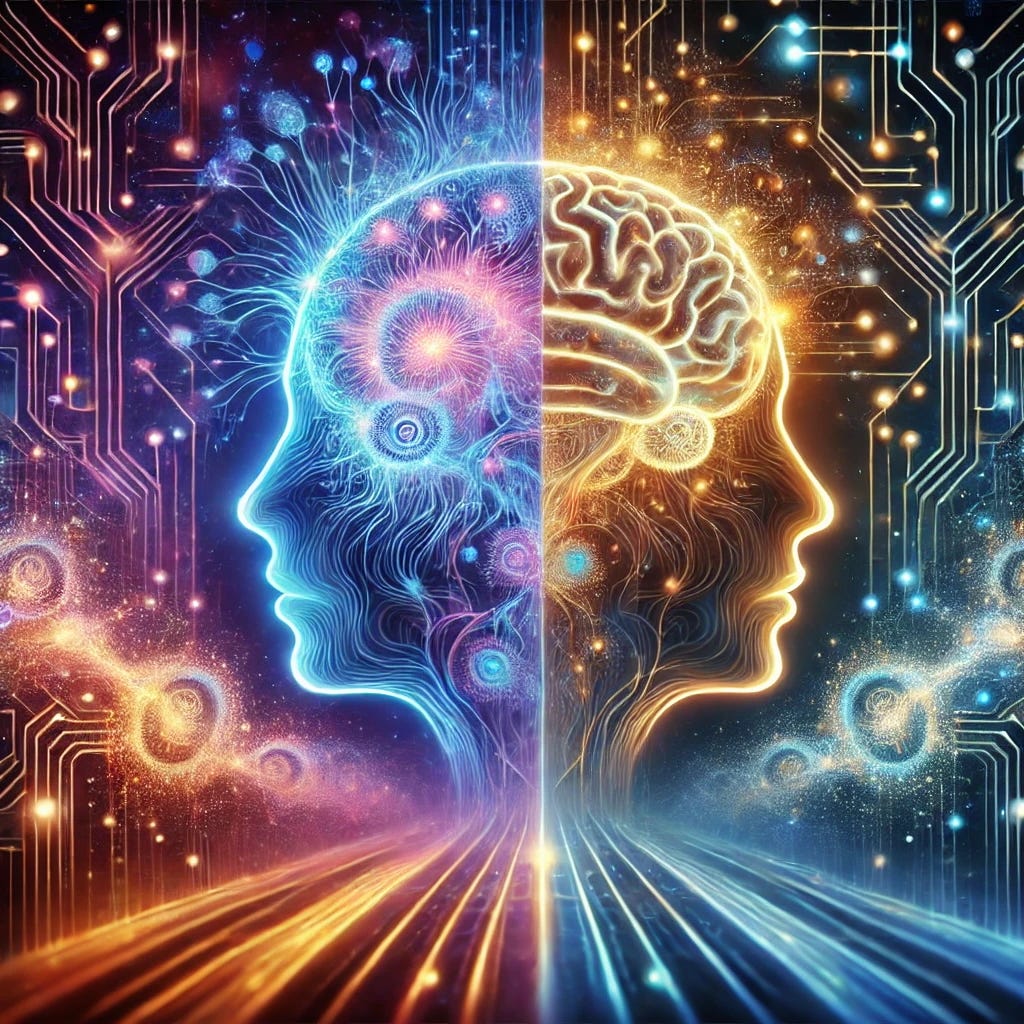Neurodiversity and the Philosophy of Mind
If consciousness is the puzzle of our existence, how do the pieces come together?
In my last post, we journeyed through the mysteries of consciousness, exploring how dual-aspect monism and Integrated Information Theory (IIT) illuminate the mind. These reflections were deeply personal, shaped by my experiences with monotropism and recovery. Today, I invite you to delve deeper as we explore the Embodied Predictive Global Workspace (EPGW)—a framework I’ve been trying to construct to understand how consciousness emerges from the interplay of mind, body, and environment.
Background
To be clear, I claim to know nothing. I like to think and write with the help of AI, which helps keep me sober. Enjoy!
Story
The first time I heard the phrase, “Your thoughts are not you.” it reshaped my understanding of the mind. This insight came during my early days of sobriety, sitting on a cushion in a Recovery Dharma meeting. For the first time, I saw my mind as something to explore rather than control. Sobriety became the catalyst for rewriting my narrative—a moment when I committed to rediscovering myself and understanding my mind.
To be honest, I often doubted whether I could make lasting changes. My journey has not been one of overnight transformation but of small, incremental steps—learning to sit with discomfort and question long-held beliefs about myself. Monotropism—a cognitive tendency for deep, singular focus—had long shaped my life. In addition, it amplified cravings and emotions, with my focus on substances often overriding other priorities. Yet, it became my greatest ally in recovery, enabling me to immerse myself in mindfulness practices and academic studies.
Let me be clear, I’m no master of mindfulness—far from it. Sometimes, I sit there, shifting uncomfortably, wondering if I’ve chosen the wrong cushion. But the practice has taught me to embrace imperfection. Prediction errors—those moments when expectation clashes with reality—allowed me to reframe my struggles as learning opportunities, aligning my lived experiences with scientific understanding. This transformative understanding offered tools to manage impulses and build resilience through education and self-awareness. I’m humbled to admit that I don’t have the answers, but I’ve learned that seeking is as valuable as the answers themselves.
A Working Framework of Consciousness
The Embodied Predictive Global Workspace (EPGW) combines three ideas to explore the nature of consciousness:
Predictive Processing: Our minds constantly try to predict the world around us.
Embodied Cognition: Consciousness arises not just in the brain but through the interplay of mind, body, and environment.
Global Neural Dynamics: Resolving prediction errors integrates disparate information into coherent awareness.
At its core, EPGW focuses on prediction errors—those moments when expectation clashes with reality—and how resolving these errors shapes our conscious experience. Imagine tuning an instrument: resolving dissonance creates harmony. Similarly, the mind’s capacity to align expectation with experience fosters growth, learning, and healing.
I realize this all sounds grand. Who am I to propose a framework for consciousness? Just someone humbled by life’s unpredictable twists and turns enough to know that asking big questions matters—even if the answers elude us for now.
Practical Applications
EPGW isn’t just a theoretical model; it’s a lens for practical change. Here are a few ways this framework could transform education, recovery, and even AI development:
Education: AI-powered personalized learning could adapt to neurodiverse cognitive styles, like monotropism. AI tools could empower students who feel out of place in traditional classrooms by reducing cognitive overload and leveraging focused interests. Imagine having a tutor who never loses patience with your endless questions—that’s the kind of support we’re talking about.
Recovery: In addiction recovery, understanding prediction errors offers a path to reframe discomfort and build resilience. For example, noticing a craving as a prediction error can shift the narrative from fear to curiosity. Sobriety taught me to recognize these errors and use them as opportunities to build healthier patterns. While it’s not always easy, I’ve found that small victories—even fleeting moments of clarity—can lead to meaningful change. Let’s be honest: sometimes, it’s just about surviving one moment at a time.
AI Ethics: As AI becomes more adaptive, ethical questions emerge. Could AI itself develop a form of consciousness? EPGW provides a framework to explore these possibilities, ensuring that AI tools serve humanity responsibly.
The Role of AI
For me, AI has been more than a tool—it’s been a collaborator in reshaping how I learn and think. Whether helping me process complex ideas or reducing cognitive overload, AI provides a steady presence in the face of prediction errors, offering clarity and coherence when I feel fragmented.
This synergy has been transformative in channeling my monotropism into productive avenues. Where once deep focus fueled my struggles, it now drives my growth. I’m deeply aware of how fortunate I am to have access to these tools. Imagine a classroom where AI empowers students by adapting to their unique cognitive profiles or a recovery program where AI supports mindfulness by helping individuals recognize and reframe their experiences.
And let’s not kid ourselves—AI isn’t perfect. It’s like that one friend who tries to help but sometimes overcomplicates things. Still, it’s there when I need it most, patiently helping me piece together the puzzle of my thoughts.
Engage
How do these ideas resonate with you? Have you experienced moments where understanding your mind’s processes transformed your journey? How might tools like AI shape your future?
If you’re curious, check out my paper on EPGW and YouTube video to explore these concepts in more depth. Additionally, if you’re interested in Recovery Dharma, the approach that helped me begin this journey, you can learn more about it here.
We’ll explore [:-)] together in the next post—or will we? Stay curious, stay questioning, and above all else, stay conscious (but maybe not too serious).



You continue to amaze me, I truly enjoy seeing your growth and continued curiosity on this journey. Good work!!